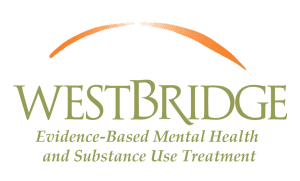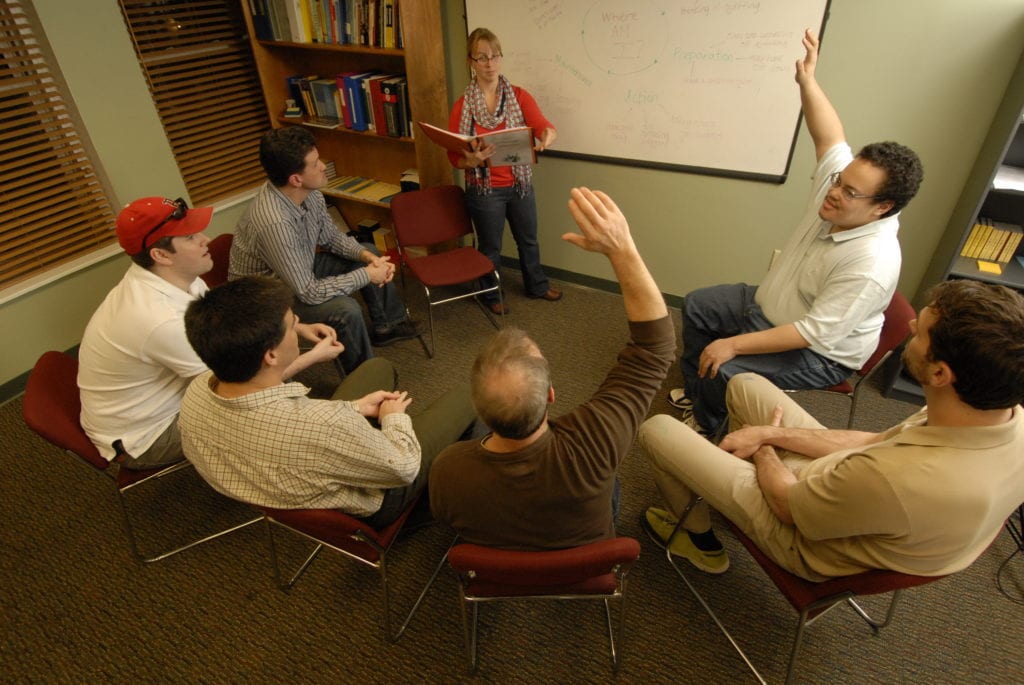The basis of WestBridge’s treatment approach is doing what works to help men and families achieve recovery from co-occurring mental illness and substance use disorders, as well as improve health and overall wellness. Research shows that when certain evidence-based clinical practices are applied, people can, and do, recover from mental illness and substance use disorders.
In our Residential Treatment Program and Community Integration Program (CIP), WestBridge utilizes a variety of evidence-based treatment approaches that have been extensively researched and proven to work for dually diagnosed individuals:
Integrated Dual Disorder Treatment (IDDT)
Treats both mental illness and substance use disorders as primary illnesses at the same time, in the same location, by the same multidisciplinary team, providing clinical treatment, case management, and community support.
By offering a personalized treatment plan that addresses both mental health and substance use together in one setting, our clinicians provide the support to manage symptoms of both disorders simultaneously.
Learn More >
Family Education & Support (FES)
A foundational component of our residential and outpatient treatment based on Behavioral Family Therapy. The primary goals of FES are to build a collaborative relationship between the treatment team and family, provide education about co-occurring illnesses, provide social support and empathy, and to identify and implement interventions for reducing stress and tension in order to improve family functioning.
Through relationship building, education, collaboration, problem-solving, and an atmosphere of hope, our Family Education & Support program helps reduce tension and stress, encourages support within families.
Through the process of FES, families build a partnership of respect, trust, and empowerment among everyone involved in the treatment process. Participation from family can make all the difference in a loved one’s ability to progress in his recovery.
Learn More >
Cognitive Behavioral Therapy
Supports identifying and modifying unhelpful thoughts and behaviors that underlie symptoms caused by psychological distress. CBT focuses on learning how to change thoughts from negative and self-defeating to positive and self-affirming.
Motivational Interviewing
Engages participants in treatment by decreasing resistance, exploring and increasing ambivalence, and developing insight and internal motivation, all leading to behavior change.
Medication Management
For many individuals, the most effective recovery results are obtained with the systematic use of medication. At WestBridge, we utilize current evidence in selecting and monitoring treatment and responses to medication. We involve individuals, their families and the care team in the decision-making process, as permitted by the individual. Every effort is made to reduce the number of medications when appropriate.
Mutual Support
Participants and families are oriented to 12-step programs and support groups and encouraged to attend. Mutual Support groups complement and extend the benefits of Integrated Dual Disorder Treatment.
Mindfulness
A practice of focusing awareness, calmly accepting emotions, thoughts, and feelings in the present moment. Mindfulness increases positivity, decreases self-blame and accelerates recovery while reducing the numbers of medications needed. Practicing mindfulness has proven to help reduce anxiety and stress, improve self-control, cope with urges to use substances, and prevent relapses.
Nicotine Recovery
WestBridge’s Residential programs are tobacco free. As individuals with dual disorders have higher smoking and mortality rates compared to individuals without co-occurring disorders, WestBridge provides education and offers nicotine replacement therapy and medication to support overall health, wellness, and recovery from all addictions.
Group Therapy
Typically led by two staff members, groups include participants at various Stages of Change. Provides structured time for discussions, encouragement, feedback, and support from peers and staff. Staff help participants understand how group dynamics in the moment might reflect the challenges they experience and help to address them. Group topics vary from education, symptom management, wellness, and skill development.
Individual Therapy
A collaborative, one on one relational process vital to developing insight, trust, and initiating change.
Helping Men Recover
WestBridge has partnered with Griffin Recovery Enterprises, a nationally recognized organization specializing in services for men. As part of this collaboration, we have added a new component to our treatment program, “Helping Men Recover” which is a curriculum that is trauma-informed and designed specifically for the needs of men.
Contingency Management
The use of rewards, identified with the participant and family, to generate behavior change and promote self-control, targeting one behavior at a time with immediate positive reinforcement.
Biofeedback Therapy
WestBridge utilizes BioSound® Therapy, a holistic approach to treatment that uses the integration of heart rate variability biofeedback, music therapy, sound frequency massage, and guided imagery to help create a natural relaxation response. This approach is based on research on the physiology of stress, emotions, and interactions between the heart and the brain, which have been shown to effectively treat anxiety, depression, posttraumatic stress disorder, insomnia, certain types of chronic pain, gastric disorders, asthma, and COPD.
Cognitive Remediation
WestBridge utilizes Cog-pack©, a cognitive rehabilitation software program that helps individuals with difficulties in executive functioning target comprehension, visual and motor functioning, attention, language use, and skills training.
Wellness
WestBridge assesses sleep patterns and history, daily diet, exercise, caffeine intake and helps each participant create a plan to support and improve health and wellness. Learn More >
In addition to the above, WestBridge provides supported employment and volunteerism, based on the evidence-based Integrated Placement and Support model.
A vocational resource assists participants to find and maintain jobs based on the participant’s preferences, strengths, and experiences. Services can vary from job readiness, to check-ins, to side by side support whether volunteering or pursuing competitive employment. Support education is available also.







